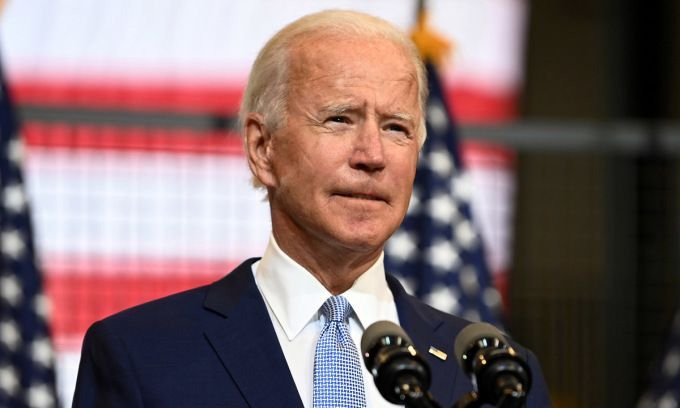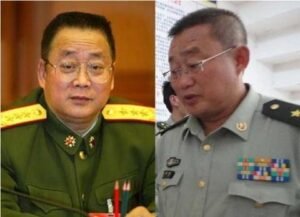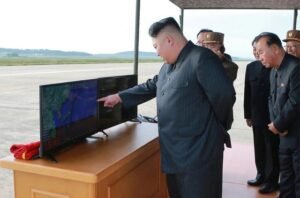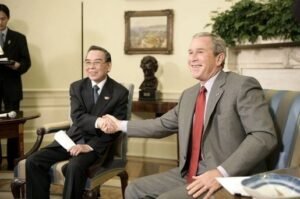
It is difficult for Biden to 'lose or lose' on trade with China 5
This aide emphasized that Joe Biden, the Democratic presidential candidate, will only `reassess tariffs` on Chinese imports if elected and does not commit to eliminating them.
According to SCMP commentator Finbarr Bermingham, Biden’s election campaign hastily dismissed the notion that he might be `weak` on China, or make concessions to the country on trade, showing the challenges.
`Trade is a front that candidates often target when challenging the incumbent president. It is a very common tactic when running for office. During the 2008 campaign, Barack Obama also criticized the way the US reached agreements.
`However, the current situation is very different, because the current President is the one who constantly talks about trade,` Baltzan added.
Pew’s survey from July showed that 73% of Americans, a record high, currently dislike China, although 51% still want to create sustainable economic relations with the country.
Joe Biden, Democratic presidential candidate, spoke in Pittsburgh, Pennsylvania, USA, on August 31.
Commentator Bermingham pointed out that the big challenge for Biden, if he wins the race for the White House, is to combine these different views into a consistent policy.
`Policymakers must realize that every trade deal is good and that more deals are always needed,` Biden campaign adviser Jake Sullivan wrote in a recent article for Foreign Policy.
In recent months, Kurt Campbell and Ely Ratner, two other Biden advisers who served as senior officials under Obama, admitted that the threat from China had previously been underestimated, but still believed that the US needed to pursue trade.
According to them, Washington needs to confront Beijing in some aspects while cooperating in other areas, ending the `zero-sum` approach to trade like the administration of President Donald Trump.
`I think Biden will retain some points in Trump’s trade policy, but he certainly will not take a harsh and aggressive tone. That is an improvement,` Frank Lavin, former deputy secretary of commerce, said.
Biden’s pledge to `create new opportunities for American workers and businesses, while helping more parts of the world reduce overreliance on countries like China,` doesn’t seem much different
`I think the real differences lie in tactics. Biden’s campaign mainly criticized Trump’s trade policy for causing conflicts with allies, instead of focusing on dealing with China. They also pointed out
With this view, Biden is expected to remove controversial tariffs on aluminum and steel from Korea, Brazil, Canada and the European Union (EU), America’s allies.
However, if Biden maintains the tariffs that Trump imposed on China, Biden will go against his own previous views on trade.
When campaigning for the Democratic presidential nomination, Biden said that `Trump’s tariff war with China has put the burden on American farmers.` Trump thinks the tariffs will be paid by China.
Senator Kamala Harris, Biden’s `deputy` running mate, also strongly condemned Trump’s approach.
Baltzan estimates that if elected, Biden will consider classifying which tariffs actually promote the goal of restoring US manufacturing and which do not.
According to commentator Bermingham, Biden is almost certainly more predictable than Trump and is expected to rebuild alliances with Australia, India, Canada, countries that are tense with China, in addition to the EU, when reaching an agreement.
However, analysts are debating whether the US’s return to multilateralism and pursuit of alliances under Biden will worry China.
`Beijing still prefers Trump over Biden, because Biden lacks individuality in his China policy. That means he will represent the US bipartisan consensus,` Wu Qiang, political analyst
Many people agreed with this view before US-China relations plummeted because of Covid-19, because Beijing was said to be more inclined to deal with a President who preferred reciprocity than one who promoted reform.
`My Chinese colleagues assess that Trump’s destruction of the alliance with the West benefits Beijing in the long run,` said Suisheng Zhao, director of the Center for China-US Cooperation at the University of Denver in the US.
`However, I think this view is completely wrong, even from China’s perspective, because he is harming the whole world and Beijing is also affected in the long run,` Zhao said.



